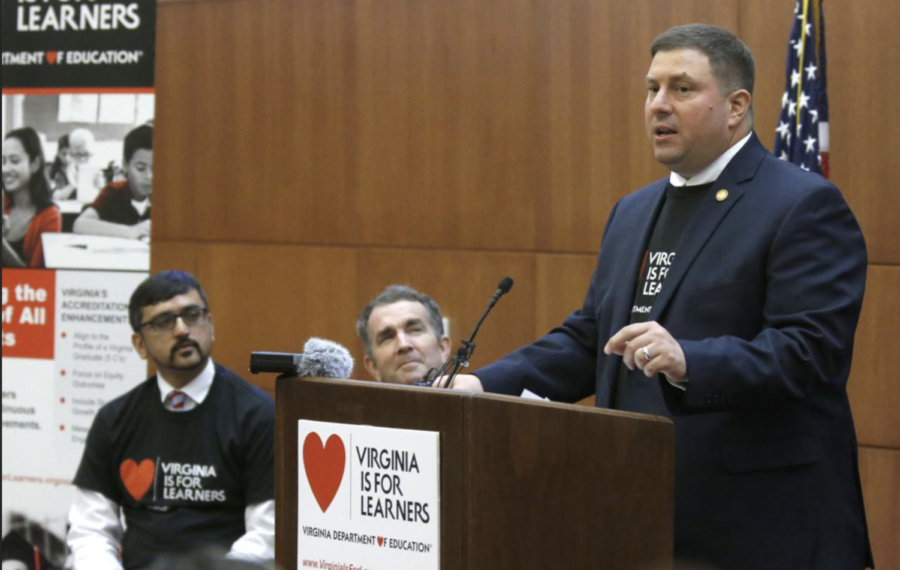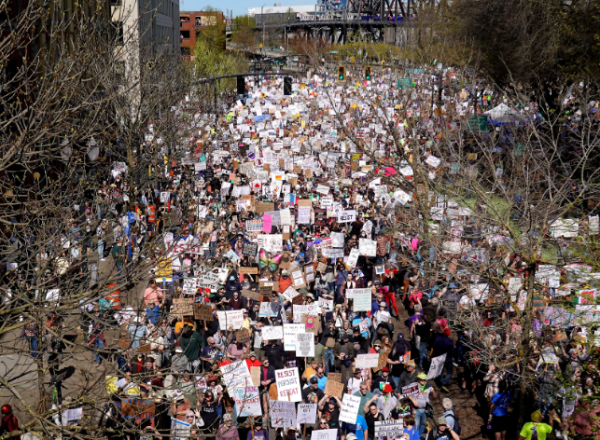Virginia schools found to be mistreating special education students
K-12 schools chief takes the podium at an education even in 2019, note Governor Northam in the background – Image via the Richmond Times-Dispatch
According to a report published by the Joint Legislative Audit Review Committee, Virginia’s public schools are failing to meet federal special education mandates and are not meeting the needs of students with disabilities.
The Joint Legislative Audit Review Committee, which serves as a watchdog agency to the General Assembly, confirmed after long speculation that Virginia is failing its special education students. The report most noticeably boasts a 30-point gap in graduation rates between students that do not have disabilities. Concluding that Virginia is not properly preparing its special education students for their lives post-graduation.
The report also stated that Virginia regularly has unqualified teachers tasked with teaching special education groups. About half of the individualized education programs were also found to not offer proper academic and functional goals.
The report also provides evidence that the Virginia Department of Education failed to regularly monitor special education programs within schools. When this information was relayed last December to Governor Ralph Northam and members of the Virginia General assembly they found it “shocking” and “devastating.”
Graduation rates vary among the different school regions of virginia. In 2019 the graduation rate bottomed out at 42.5% in Caroline County and reached its peak of 68.2% in Stafford County. In Northern Virginia graduation rates have peaked at 70% in past years, however, compared to regular students with an overall graduation rate of over 90% there is quite a gap.
The report found that, “Economic factors, including the percentage of students qualifying for free and reduced-price lunch and poverty rate, and geographic areas of school divisions do not appear to account for the variation in the proportion of students enrolled in special education.” But it also discovered there is a major jump in the number of Black students enrolled in special education programs. In Fredericksburg, Black students make up 33% of the total student populace but account for 43% of those enrolled in special education programs in the county.
Data showed that most schools to some degree hire provisionally licensed teachers, which requires teachers to complete one class on special education teaching before they can be hired. The report scrutinizes this, saying it is not enough. In most counties, provisionally licensed teachers account for about ¼ of special education teachers.
A group of parents already sued Fairfax County Public Schools (FCPS) over this specific issue in 2019. Parents argued that students were excessively restrained, punished and secluded. In May of 2020, the state launched an investigation into FCPS’ online learning practices, after allegations arose that the County was not providing equal educational opportunities during online learning.
Investigators involved in the report reviewed 90 special education programs across the entire state. They “Found that about one-third lacked a description of the student’s academic or functional needs, one-quarter did not describe the effect of the disability on the student’s educational performance and one-half lacked academic or functional goals.”
The committee’s report comes to a close with 27 recommendations for Virginia’s public schools. They suggest changes be made through legislative action and or improvements be made within the Virginia Department of Education. This concerning report made by the JLARC has firmly established that the Virginia’s Department of Education must fix its current issues within their special education programs.
Kyle is a senior at South Lakes and a first year Sentinel staffer.














